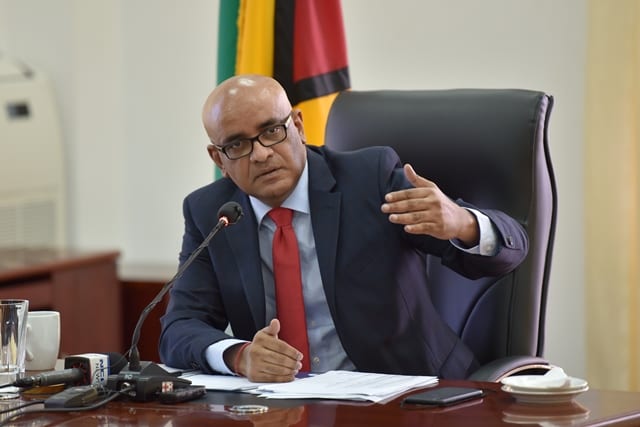Delays and infractions by oil companies in fulfilling their commitments to the Guyana government can cost the country dearly. Vice President Dr. Bharrat Jagdeo has said that if companies sit on a block for three years without doing the work, Guyana loses three years of potential development. As such, the new model Production Sharing Agreement (PSA), to be rolled out for Guyana’s first offshore competitive auction, will feature new safeguards.
These new terms are informed by Guyana’s experience with some companies, like CGX Energy. Discussing this company’s most recent delay involving its Corentyne Block work programme, the Vice President said in November that the new PSA terms are purposed to prevent such issues.
Of the 14 blocks to be put up for auction, 11 will be situated in the shallow water, and three in the ultra-deepwater acreage called Area C. Shallow water blocks will be awarded for a period of five years, and deepwater blocks for 10 years. All contractors will hold the blocks for three years initially, during which they are expected to conduct seismic tests and relinquish 50% of the acreage at the end of the period. The remaining two years for shallow water blocks will be split into two one-year exploration periods, and the remaining seven years for deepwater blocks will also be allotted for exploration. He did not indicate what the split would be.
Each bidder will be required to put up a work programme, with the criteria for the bid to be weighted between the work programme and the signature bonus. Companies will have to guarantee that they will meet the work programme, as the government intends to institute a penalty commensurate with the unmet commitments.
Dr. Jagdeo said, for example, that if a company commits US$30 million to a period of the license and fails to follow through, that money becomes the penalty. He said, “This is to prevent people taking a block and sitting on it for three years, and then at the end of the three years, you hear ‘We can’t do anything. We need to relinquish it.’”
The VP said the safeguard would help, and that the government has been assured by its principal consultant, IHS Markit, that such a provision is not inconsistent with industry practice.
CGX had been awarded three oil blocks by the Guyana government in the 2012-2013 period – Corentyne, Demerara and Berbice. The company failed to meet its commitments even after several extensions by the government.
It is “none of our business” if the company “can’t raise the money,” Dr. Jagdeo had said. Eventually, CGX, its subsidiary ON Energy, and partner Frontera Energy, came to an agreement with the government to relinquish the Demerara and Berbice blocks.
Dr. Jagdeo had told reporters, early November, that he knows CGX is not making its commitment, in relation to its last held block, Corentyne. He had said the government may have to have a “serious discussion” with the co-venturers. This was shortly after CGX announced that the Noble Discoverer is stalled in Trinidad, in use by Shell, and would not make its expected October arrival in Guyana. CGX later revealed that the licensed deadline for the drilling of the Wei-1 well (November 27) had passed, and that the government agreed to extend this deadline to January 31, 2023.
CGX has also been entrusted with the construction of a deepwater port in Berbice, a highly anticipated development expected to inject new life into the county’s economy. The company announced several months ago that there were “certain delays” that made the fourth quarter of 2022 an unrealistic timeline for completion of the offshore supply base of the port. Both the President, Dr. Mohamed Irfaan Ali, and the Minister of Natural Resources, Vickram Bharrat, publicly expressed discontent with the company’s pace. The port is expected to be completed in the new year. CGX’s most recent release indicated that in-river construction activity had started on an access trestle, as well as dredging of the Berbice river. Construction of a wharf, perpendicular to the trestle, will follow.



